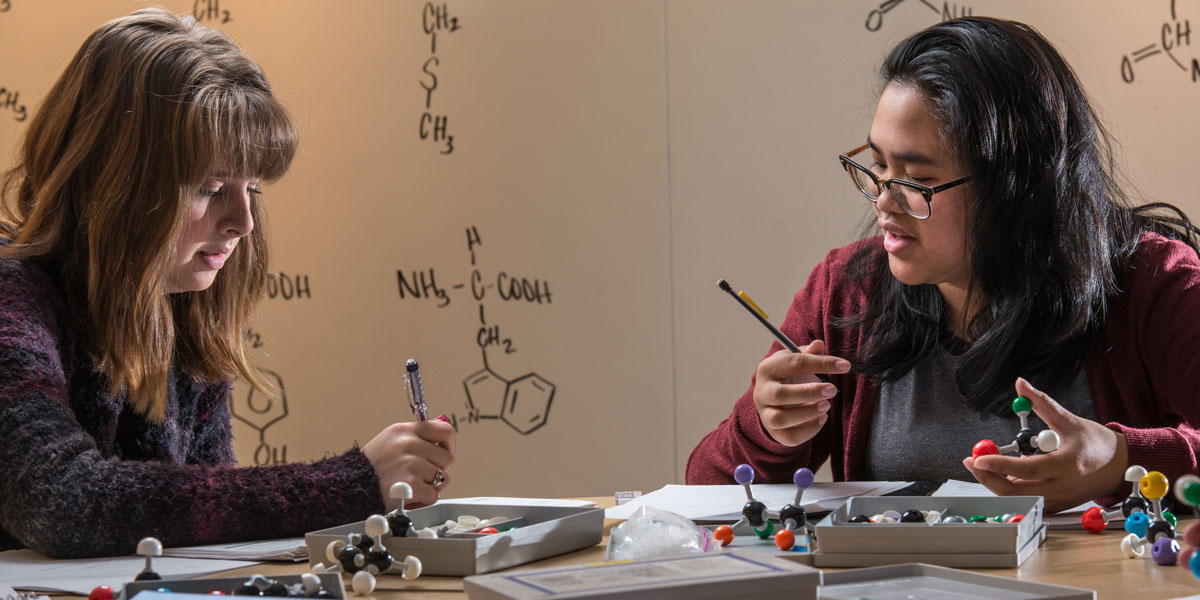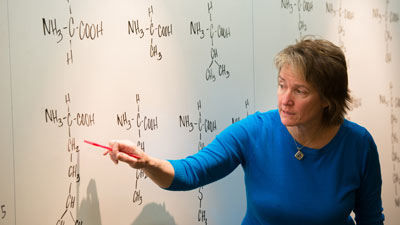Chemistry B.S.
Explore the chemistry bachelor’s degree program at the University of Alaska Anchorage
UAA’s Bachelor of Science in chemistry with a biochemistry option is a central scientific discipline that connects chemical, physical and biological sciences. Earn your degree and gain a broad-based, liberal arts education with a biological approach to chemistry.Chemistry scholarships and financial aid
Qualified chemistry majors can apply for scholarships and awards such as the Ardell French Memorial Endowment and John Russell Gay Memorial Science Scholarship to help pay for college. Learn more about financial aid opportunities at UAA.
Satellite campuses and online classes
UAA offers flexible options for earning your bachelor’s degree in chemistry. Several chemistry courses are available online, as well as at regional satellite sites on the Kenai Peninsula College, Kodiak College and Mat-Su College campuses.
Student advising in chemistry
UAA’s chemistry degree program requirements and curriculum evolve to reflect developments in the field. Faculty and academic advisors in the chemistry department help you develop a plan and answer questions to keep you on track to earn your bachelor’s degree in chemistry.
Peer tutoring and supplemental instruction
Free peer tutoring through the Learning Commons is available in entry- to 300-level chemistry courses.
Honors in chemistry
Complete an independent research project and a written assignment in the style of a chemical journal based on the research performed. Read more about Graduation with Honors requirements and check with the Chemistry department about how to apply for departmental honors.
Did you know..
Participate in extensive undergraduate research, which will help you pursue a career in medicine, dentistry, veterinary medicine, pharmacy or science.
What can you do with a chemistry degree from UAA?
UAA’s Bachelor of Science in chemistry prepares you for graduate school in biochemical, biological, medical and other science-related or professional degree programs. With a chemistry bachelor’s degree, you open up a variety of pathways leading to meaningful careers in education, government or industry.Chemistry-related graduate and professsional programs
- Graduate Chemistry (M.S., Ph.D.)
- Graduate Biology (M.S., Ph.D.)
- WWAMI School of Medicine
- Doctor of Pharmacy
- Doctor of Veterinary Medicine
- Doctor of Dental Medicine
- Chemical Engineering
- Chemists and materials scientists
- Forensic science technicians
- Environmental science and protection specialists
- Agricultural and food scientists
- Chemical and environmental engineers
- Conservation scientists and foresters
- Geological and petroleum technicians
- Education and public outreach
- Pharmaceutical and healthcare assistants and technicians
- Occupational safety and health specialists and analysts
Chemistry bachelor’s degree program highlights
The University of Alaska Anchorage offers a variety of opportunities and resources to learn, apply and practice concepts and methods in chemistry.- Receive mentorship in undergraduate research. Program faculty, as well as the Honors College and Office of Research, will support you through each phase of your independent or faculty-led research projects, including conception, grant funding, experimental design, technical lab skills, data analysis and presentation.
- Gain hands-on experience using modern analytical instruments. Housed in the ConocoPhillips Integrated Science Building, the chemistry department offers access to high-tech equipment and facilities for undergraduate research. Researchers studying everything from public health safety issues to climate change can address organic and inorganic toxic and nontoxic substances in soil, water, rock, tissue and plasma.
- Collaborate with students across a variety of disciplines in the Chemistry Resource Center. The facility houses Windows workstations with word processing, spreadsheet, publishing and presentation software, as well as course-specific software.
Chemistry bachelor’s degree program curriculum
Receive an introduction to five subdisciplines in chemistry — inorganic, analytical, organic, physical and biochemical — followed by advanced studies in organic, analytical and biochemistry. Program electives offer flexible options for you to focus on areas of personal interest to earn a bachelor’s degree that fits your goals.Throughout your coursework, you have a variety of opportunities to design and conduct experiments that incorporate concepts and methods in research, including fieldwork, laboratory analyses, instrumentation, theoretical development and drawing conclusions
Top classes for chemistry majors
- Gain extensive, hands-on experience with state-of-the-art instrumentation and understand how to address chemical questions in Chemical Instrumentation and Methods.
- Investigate the principles of thermodynamics, equilibrium and kinetics through the lens of biochemical systems in Biophysical Chemistry.

















